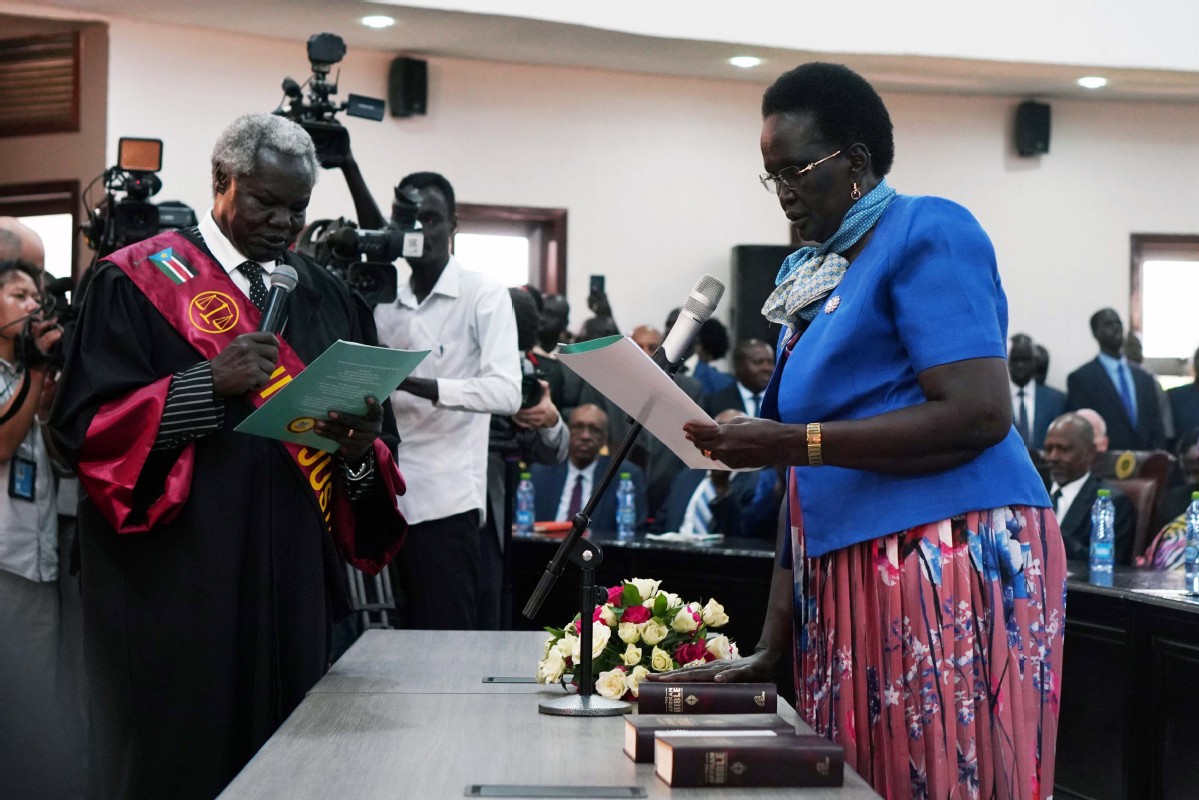South Sudan rivals bury the hatchet
China Daily Global | Updated: 2020-02-24 09:12

JUBA, South Sudan-South Sudan has opened a new chapter in its fragile emergence from civil war as rival leaders formed a coalition government that many observers prayed would last this time around.
A day after South Sudanese President Salva Kiir dissolved the previous government, opposition leader Riek Machar was sworn in on Saturday as his deputy, an arrangement that twice collapsed in fighting during the conflict that killed nearly 400,000 people.
Machar was sworn in as the first vice-president along with Taban Deng Gai, James Wani Igga and Rebecca Nyandeng de Mabior as vice-presidents.
"I do hereby swear that I shall be faithful and bear diligence to the Republic of South Sudan," Machar said in his oath in a ceremony attended by representatives from the international community.
Kiir declared "the official end of the war, and we can now proclaim a new dawn". Peace is "never to be shaken ever again", he said, adding that he had forgiven Machar and asked for his forgiveness, to applause. He called on their respective Dinka and Nuer ethnic groups to do the same.
The newly formed transitional unity government, which is expected to run for three years under the revitalized peace deal, will now have to embark on reforms to pave the way for general elections.
In his remarks, Machar expressed his determination to work with Kiir and other peace partners to ensure full implementation of the peace deal.
"I want to assure you that we will work collectively to end your suffering. I reiterate my commitment to work closely with President Kiir to implement the agreement in letter and spirit."
He exuded confidence that the formation of the revitalized transitional government will create a new momentum and a new spirit of commitment and cooperation in the implementation process of the agreement in order to avoid the delays experienced during the pretransitional period.
The two leaders had agreed to resolve outstanding issues including security arrangements after the formation of the unity government.
Other outstanding issues include the process of integrating tens of thousands of former rival forces into a united army.
Nhial Tit Mamer, a researcher and director of environmental natural resources program at Sudd Institute, a think-tank in Juba, said neither Riek Machar, a leader of Sudan People's Liberation Movement-In Opposition, nor President Salva Kiir has won, but the settlement came as a result of compromise.
"The formation of the new unity government without further extension can be treated as a compromise agreement because there is no side that has won."
The world's youngest nation slid into civil war in 2013, two years after winning a long-fought independence from Sudan, as supporters of Kiir and Machar clashed.
Under the 2018 revitalized peace deal that was signed in Ethiopia, the government and opposition groups are tasked with establishing a unified national army to avoid a repeat of the violence that destroyed the 2015 peace agreement.
Saturday was the third deadline for the formation of the unity government.
XINHUA - AGENCIES
























